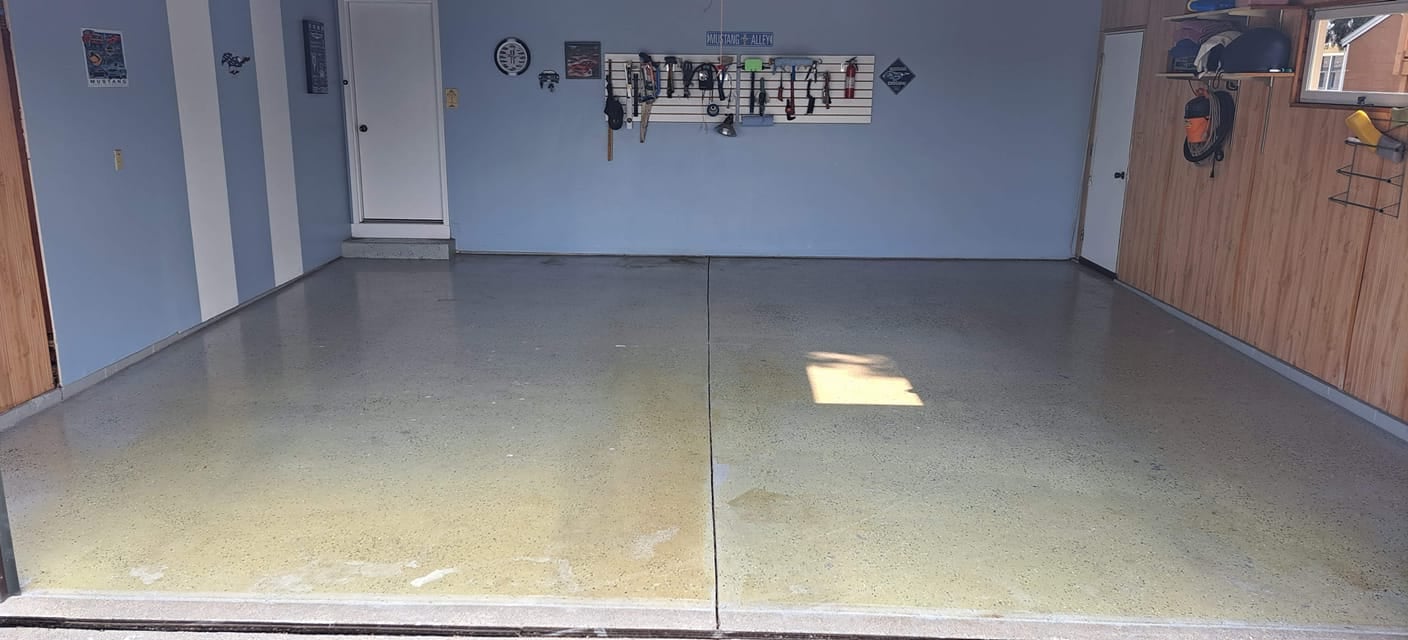Common Problems with Epoxy Concrete Floor Coatings: What You Need to Know
June 25th, 2024 | 2 min. read

Are you considering an epoxy coating for your floor? While epoxy's glossy finish might look appealing, it's crucial to understand the potential challenges it presents, particularly in demanding environments like garages or industrial spaces. At Floor Shield, we've seen our fair share of floors gone wrong due to inappropriate coatings. This guide will walk you through the common issues with epoxy coatings, informed by our extensive experience in the industry. Our goal is to help you decide if epoxy is the right choice for your needs or if another solution might be better.
What Are Epoxy Coatings and Where Are They Used?
Epoxy coatings are made from a mixture of resin and hardener that, when combined, form a rigid, plastic-like surface over concrete floors. Known for their resilience and protective qualities, these coatings are popular in a variety of settings, ranging from residential garages to commercial warehouses.
Top Problems with Epoxy Floor Coatings in High-Traffic Areas
Wear Resistance and Traffic Impact
- Lack of Durability: Contrary to popular belief, many epoxy floors are not sufficiently wear-resistant. This becomes evident with visible wear and tear in high-traffic areas, particularly in commercial settings or busy households.
- Susceptible to Hot-Tire Pickup: In garages, the heat from car tires can cause epoxy coatings to soften and degrade, a phenomenon known as hot-tire pickup, which leads to permanent staining and deterioration.
How UV Light and Temperature Affect Epoxy Floor Coatings
UV Instability and Color Fading
- Color Degradation: Without UV stability, epoxy floors can degrade quickly when exposed to sunlight. This results in a yellowed and dulled appearance, significantly detracting from the floor's initial glossy look.
Temperature Sensitivity
- Curing Problems: Epoxy's effectiveness is highly temperature-dependent. Application in temperatures below 40 degrees Fahrenheit can prevent the coating from curing properly, while high temperatures can accelerate the curing process, leading to an uneven finish with bubbles.
The Risks of DIY Epoxy Floor Coating Kits
DIY epoxy kits are readily available and marketed as a quick fix solution. However, these kits often lack the necessary components for a durable finish, such as a urethane or polyaspartic topcoat, leading to poor performance under stress.
Best Practices for Installing Epoxy Floor Coatings
The longevity and effectiveness of an epoxy coating significantly depend on professional installation. Key steps include:
- Comprehensive Surface Preparation: Ensuring the concrete surface is immaculately clean and adequately etched is crucial for adhesion.
- Professional Application: Hiring a professional ensures that the epoxy is applied under the right conditions, using the correct techniques to avoid common pitfalls like insufficient thickness or uneven coverage.
Polyurea and Polyaspartic Coatings: Viable Alternatives to Epoxy
Considering the limitations of epoxy, more robust alternatives like polyurea and polyaspartic coatings are often recommended. These materials are not only more flexible but also offer improved UV stability and durability, making them suitable for a wider range of environments.
How to Choose the Right Floor Coating for Your Needs
Selecting the right floor coating involves understanding your specific needs and the performance characteristics of various coating options. Factors to consider include:
- Traffic and Usage: The level of foot or vehicle traffic can significantly influence the choice of coating.
- Environmental Exposure: Considerations like sunlight exposure, temperature fluctuations, and moisture levels are crucial.
Conclusion: Making the Right Choice for Long-Lasting Floor Coatings
While epoxy might seem like an attractive option due to its glossy finish and initial durability, it's important to consider its long-term performance and suitability for your specific environment. At Floor Shield, we aim to guide you through these decisions, ensuring you choose a floor coating that meets your needs and lasts for years. Remember, the right decision might sometimes mean looking beyond epoxy to alternatives that can offer better durability and fewer maintenance issues.
If you’d like a free, no-obligation quote for Floor Shield’s 100% polyaspartic concrete coatings or have any questions, fill out the form below.
